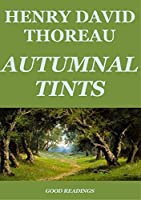I had to laugh when I started this long essay. Thoreau begins by saying how surprised Europeans and even many Americans are when they first see the spectacular foliage of a New England autumn. Today, we in New England are besieged by RVs and SUVs with out-of-state plates clogging our roads and highways as leaf-peepers from all over chase peak foliage.
My hilarity soon turned to admiration as Thoreau takes us through the season’s offerings, from the purple grasses of late August to the scarlet oaks of late October. His lovely descriptions include what natural science information he has and sometimes lead to larger thoughts.
How they are mixed up, of all species, Oak and Maple and Chestnut and Birch! But Nature is not cluttered with them; she is a perfect husbandman; she stores them all. Consider what a vast crop is thus annually shed on the earth! This, more than any mere grain or seed, is the great harvest of the year. The trees are now repaying the earth with interest what they have taken from it. They are discounting. They are about to add a leaf’s thickness to the depth of the soil.
How many flutterings before they rest quietly in their graves! They that soared so loftily, how contentedly they return to dust again, and are laid low, resigned to lie and decay at the foot of the tree, and afford nourishment to new generations of their kind, as well as to flutter on high! They teach us how to die. One wonders if the time will ever come when men, with their boasted faith in immortality, will lie down as gracefully and as ripe,–with such an Indian-summer serenity will shed their bodies, as they do their hair and nails.
Some sections made me sad, such as the one on elm trees. I have a slight memory of great rows of elm trees from my early childhood before they were decimated by Dutch Elm Disease.
Other sections are thrilling, such as this excerpt from the section on red maples:
How beautiful, when a whole tree is like one great scarlet fruit full of ripe juices, every leaf, from lowest limb to topmost spire, all aglow, especially if you look toward the sun! . . . If such a phenomenon occurred but once, it would be handed down by tradition to posterity, and get into the mythology at last.
I also recognise his personal relationship with certain trees.
I notice a small one, half a mile off across a meadow, against the green wood-side there, a far brighter red than the blossoms of any tree in summer, and more conspicuous. I have observed this tree for several autumns invariably changing earlier than its fellows, just as one tree ripens its fruit earlier than another. It might serve to mark the season, perhaps. I should be sorry, if it were cut down.
One of my favorite maples was cut down last winter and I am missing it greatly just now. However, there are many other trees to wander among and admire, so I will go and do that now. I hope you will join me in appreciating this brilliant season and Thoreau’s appreciative essay.
What trees are you walking among?
